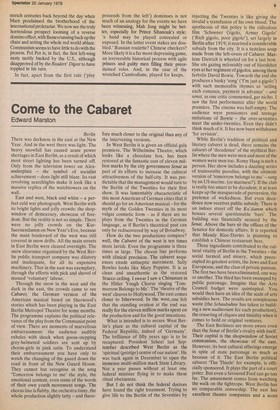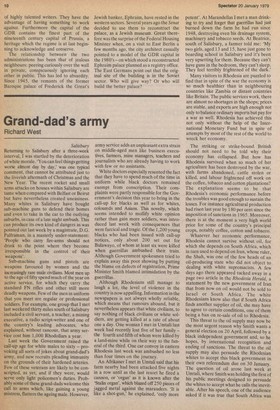Come to the Cabaret
Edward Marston
Berlin There was darkness in the east at the New Year. And in the west there was light. The heavy snowfall has caused acute power shortages in East Berlin, as a result of which most street lighting has been turned off. Only from the television tower on Alexanderplatz — the symbol of socialist achievement —does light still blaze. Its vast revolving searchlights make it look like a massive replica of the watchtowers on the wall.
East and west, black and white — a perfect cold war photograph. West Berlin with its bright lights and jolly crowds: the shopwindow of democracy, showcase of freedom. But the reality is not so simple. There were no jolly crowds on the Kurfuerstendamm on New Year's Eve, because the main boulevard of the west was still covered in snow drifts. All the main streets in East Berlin were cleared overnight. The snow clearance organised by the West Berlin public transport company was dilatory and inadequate, for all its expensive machinery. That in the east was exemplary, through the efforts with pick and shovel of massed 'voluntary' labour.
Through the snow in the west and the dark in the east, the crowds came to see Cabaret, the German version of the American musical based on Sherwood's stories which has been playing in the East Berlin Metropol Theatre for some months. The programme explains the political relevance of the play from the Communist point of view. There are moments of marvellous embarrassment: the audience audibly exhales with shock when goose-stepping grey-helmeted soldiers are sent up by chorus-girls in pink satin. To understand their embarrassment you have only to watch the changing of the guard down the road in front of the New Guard House. They cannot but recognise in the song 'Tomorrow belongs to me' the style, the emotional content, even some of the words of their own youth movement songs. The chorus line is flabby, the orchestra tinny, the whole production slightly tatty — and there fore much closer to the original than any of the intervening versions.
In West Berlin it is given an official gala premiere. The Wilhelmine Theatre, which looks like a chocolate box, has been restored at the fantastic cost of eleven million marks by the city government Senat as part of its efforts to increase the cultural attractiveness of the half-city. It was predictable that the management would turn to the Berlin of the Twenties for their first show. It was lamentably characteristic of this most American of German cities that it should go for an American musical —for the myth of the Golden Twenties in its most vulgar cosmetic form — as if there are no plays from the Twenties in the German language, as if Berlin's theatrical past can only be rediscovered by way of Broadway.
How do the two productions compare? well, the Cabaret of the west is ten times more lavish. Even the programme is three times as large. The chorus line performs with clinical precision. The cabaret sequences exude antiseptic merriment. Sally Bowles looks like Mary Poppins. It is as clean and unauthentic as the restored Stucco ceiling. I swear I saw a Chinaman in the Hitler Yough Chorus singing 'Tommorrow Belongs to Me'. The 'theatre of the west' cleaves to Hollywood. The east comes closer to Isherwood. In the west, one felt that the standing ovation at the end was really for the eleven million marks spent on the production and for the good intentions.
What is intended is to secure West Berlin's place as the cultural capital of the Federal Republic, indeed of 'Germany'. The brilliance of fifty years ago is to be recaptured. President Scheel last September described West Berlin as the 'spiritual (geistige) centre of our nation'. He was back again in December to open the immense multi-million mark State Library. Not a year passes without at least one federal minister flying in to make these ritual obeisances.
But I do not think the federal doctors have found the right treatment. Trying to give life to the Berlin of the Seventies by injecting the Twenties is like giving the invalid a transfusion of his own blood. The apotheosis of this policy is the ridiculous film `Schoener Gigolo, Armer Gigolo' Mich gigolo, poor gigolo'), set largely in Berlin after 1919; it received a considerable subsidy from the city. It is a tasteless soup made from the left-overs of Cabaret. Marlene Dietrich is wheeled on for a last bow. She sits gazing moonishly out of bloodshot eyes at her regiment of gigolos, among them ferbrile David Bowie. Towards the end she produces a husky 'song' ('I'm just a gigolo') with such memorable rhymes as 'selling each romance, payment in advance' — und sonst, as one critic commented, gar nichts. I saw the first performance after the world premiere. The cinema was half-empty. The audience were pensioners and teenage imitations of Bowie — the over-seventies meet the under-twenties. Even they didn't think much of it. It has now been withdrawn 'for revision'.
While Berlin's tradition of political and literary cabaret is dead, there remains the cabaret of 'decadence' of the mythical Berlin where the men were men and most of the women were men too. Romy Haag is such a person. Her show includes a dazzling series of transvestite parodies, with the ultimate version of 'tomorrow belongs to me' — sung by an US marine. (or mariness?). If the club is really too smart to be decadent, it at least keeps up the masquerade of perversion, the pretence of wickedness. But even decadence now receives public subsidy. There is an indoor street off the Ku'damm which houses several questionable 'bars'. The building was financially secured by the Senat. Above the bars sit the offices of the Senator for domestic affairs. It is reported that Mandy Rice-Davies is planning to establish a Chinese restaurant here.
Three ingredients contributed to the cultural vitality of Berlin in the Twenties — the social turmoil and misery, which preoccupied its greatest artists, the Jews and East Europeans, and the class of private patrons. The first two have been eliminated, one way or another. The third has been swamped by public patronage. Imagine that the Arts Council budget were quintupled. You would then have an idea of the scale of arts subsidies here. The results are conspicuous waste (the Schaubuhne has taken to building a new auditorium for each production), the cosseting of cliques and timidity when it comes to bold or original ventures.
The East Berliners are more aware even than the Senat of Berlin's rivalry with itself. Their capital is the shopwindow of Soviet communism, the showcase of the east. However, its best cultural offerings emerge in spite of state patronage as much as because of it. The East Berlin political cabaret 'The Thistle' for example, is officially sponsored. It plays the part of a court jester. But even a favoured Fool can go too far. The amusement comes from watching the walk on the tightrope. West Berlin has no comparable censorship. The east has excellent theatre companies and a score of highly talented writers. They have the advantage of having something to work against. Furthermore the capital of the GDR contains the finest part of the nineteenth century capital of Prussia, a heritage which the regime is at last beginning to acknowledge and conserve.
The relationship between the two administrations has been that of jealous neighbours: peering curiously over the wall in private, conspicuously ignoring each other in public. This has led to absurdity. Since 1945, the remants of the former Baroque palace of Frederick the Great's Jewish banker, Ephraim, have rested in the western sectors. Several years ago the Senat decided to use them to reconstruct the palace, as a Jewish museum. Great therefore was the surprise of the Federal Housing Minister when, on a visit to East Berlin a few months ago, the city architect casually pointed to a model of the GDR capital in the 1980's — on which stood a reconstructed Ephraim palace planned as a registry office. The East Germans point out that the original site of the building is in the Soviet sector. Who will give way? Or who will build the better palace?



































 Previous page
Previous page